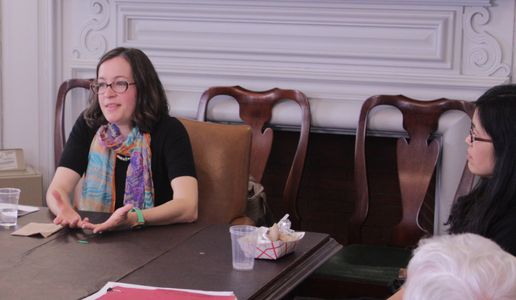Faculty Book Talk: Keller on Mexico’s Cold War
Renata Keller, Assistant Professor of International Relations, discussed her Mexico’s Cold War: Cuba, the United States, and the Legacy of the Mexican Revolution as part of the 2016-2017 Faculty Book Talk Series on April 10, 2017.
The event was attended by Pardee School faculty and students and began with a talk by Keller on the history of the Cold War in Mexico. Keller’s talk was followed by a question and answer session with students and faculty.
Mexico’s Cold War examines the history of the Cold War in Mexico and Mexico in the Cold War. Mexico did in fact suffer from the political and social turbulence that characterized the Cold War era in general, and by maintaining relations with Cuba it played a unique, and heretofore overlooked, role in the hemispheric Cold War.
“Mexico’s Cold War was a multi-sided, geopolitical and local confrontation over all sorts of questions on ideology, economics, culture, citizenship and security,” Keller said. “In Mexico specifically, a lot of these struggles centered around the legacy of the Mexican revolution of 1910, which looms so large even today over Mexican politics.”
Keller discussed her motivation for writing Mexico’s Cold War, and how the book fills in the gaps in previous histories of the Cold War in Latin America.
“I decided to this project because other histories of the Cold War in general or the Cold War in Latin America tended to overlook Mexico,” Keller said. “They tend to portray Mexico as being very stable, very peaceful and they kind of bought into this myth of Mexico as a ‘democracy.’ Not completely a democracy, but there was this idea that Mexico was stable and that the Cold War didn’t really happen there. Of course it did, it was an important moment in Mexican history and Mexico did play an important role in the wider Cold War in Latin America.”
According to Keller, the Cold War in Mexico was not the direct result of the fallout of World War II, but as a consequence of the Cuban Revolution in 1959.
“In Mexico what was different was the Cold War began not in the years following World War II, but really as a result of the Cuban Revolution,” Keller said. “The Cuban Revolution was what really sparked Mexico’s Cold War because Fidel Castro’s triumph over a dictatorial regime really resonated in Mexico and it was really the first successful revolution since the Mexican Revolution.”
Renata Keller’s research and teaching interests focus on Latin American history, particularly the connections between foreign and domestic politics, the dynamics of the Cold War, and U.S. relations with Latin America. She has special expertise in Mexican, Cuban, Chilean, and Argentine history.
